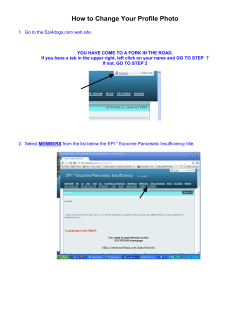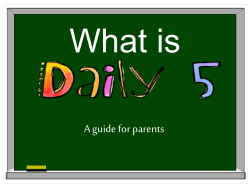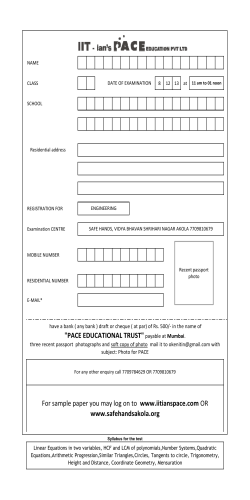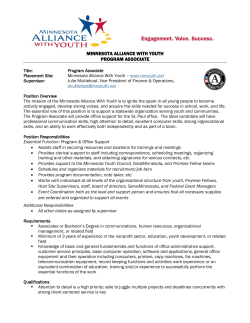
Hello and Welcome to My Portfolio Website
Hello and Welcome to My Portfolio Website http://www.portfoliogen.com/mbishop/ http://portfoliogen.com/mbishop/ ( 1 out of 21 ) Portfoliogen.com A Little About Myself "It is the supreme art of the teacher to awaken joy in creative expression and knowledge." ~Albert Einstein Welcome to my portfolio! I am excited to be working with children and really making a difference in their lives. Being a teacher is who I am. I remember being so upset in class as a child because I did not understand what was being talked about in the classroom. A dedicated teacher helped me by recognizing my learning disability and finding ways to assist me. I owe my success to this amazing teacher who changed my life. Those experiences made me who I am today and I am now helping others. I assist children making the transition to our school systems here in the United States both academically and culturally. I love my job and am very proud to be in this position making a difference. http://portfoliogen.com/mbishop/ ( 2 out of 21 ) Portfoliogen.com Educational Philosophy "It is the supreme art of the teacher to awaken joy in creative expression and knowledge." ~Albert Einstein Welcome to my portfolio! Thanks for visiting! I come to this profession with definite beliefs in mind in relation to who I will be as a successful teacher, employee, and member of your community. I am a teacher who most importantly embraces the development of a trusting environment with my students. In my opinion, students only open up to learning beyond the borders of basic requirements when trust is present. One of the skills I will utilize in building the before mentioned environment is found in the ability to communicate efficiently with one’s students. I will not only provide educational data from the curriculum, but am a good listener willing to respond in kind to all ideas presented by the classroom community. I will also respond well to change in being open to learning from others in trying new approaches in lesson construction and delivery. My teaching methodologies main objective is to inspire learning of content as well as developing the skills necessary for students to explore content and draw intelligent conclusions independently. I am committed to inspiring this critical exploration through stimulating teamwork amongst peers, being aware of different learning styles, teaching across subject boundaries, providing individualized accommodations, involving students in goal setting where appropriate, and being able to recognize and seize the moment when teachable moments occur. All of these approaches can be fostered through creative lesson planning. http://portfoliogen.com/mbishop/ ( 3 out of 21 ) Portfoliogen.com Websites I Use Actively OnCourse Systems SME & Lesson Planning) Khan Academy IXL (Math & Labguage Arts K-12) Animoto Video Slideshow Creation Edhelper The Common Core Initiative Freetech4teachers The Model Curriculum http://portfoliogen.com/mbishop/ ( 4 out of 21 ) Portfoliogen.com Photo: 1 We had a great time showing off our hard work at the multicultural fair! http://portfoliogen.com/mbishop/ ( 5 out of 21 ) Portfoliogen.com Photo: 2 Multicultural Fair http://portfoliogen.com/mbishop/ ( 6 out of 21 ) Portfoliogen.com Photo: 3 The science fair made a lot of noise this year! http://portfoliogen.com/mbishop/ ( 7 out of 21 ) Portfoliogen.com Photo: 4 A lesson about animals that was really hootastic! http://portfoliogen.com/mbishop/ ( 8 out of 21 ) Portfoliogen.com Photo: 5 Frank Zappa Quote http://portfoliogen.com/mbishop/ ( 9 out of 21 ) Portfoliogen.com Photo: 6 http://portfoliogen.com/mbishop/ ( 10 out of 21 ) Portfoliogen.com Photo: 7 The Mind is Everything http://portfoliogen.com/mbishop/ ( 11 out of 21 ) Portfoliogen.com Photo: 8 http://portfoliogen.com/mbishop/ ( 12 out of 21 ) Portfoliogen.com Photo: 9 http://portfoliogen.com/mbishop/ ( 13 out of 21 ) Portfoliogen.com Photo: 10 http://portfoliogen.com/mbishop/ ( 14 out of 21 ) Portfoliogen.com Photo: 11 http://portfoliogen.com/mbishop/ ( 15 out of 21 ) Portfoliogen.com Photo: 12 http://portfoliogen.com/mbishop/ ( 16 out of 21 ) Portfoliogen.com Subjects Certified Subjects Special Education (New Jersey) Elementary K-8 (New Jersey) http://portfoliogen.com/mbishop/ ( 17 out of 21 ) Portfoliogen.com My Education Master's in Psychology University of Arizona Master's in Education University of Arizona http://portfoliogen.com/mbishop/ ( 18 out of 21 ) Portfoliogen.com My Documents Resume Type: pdf | Size: 74 kb Philosophy of Education & Vision Type: pdf | Size: 80 kb UbD Unit Plan Type: pdf | Size: 81 kb Zones of Regulation Activity Type: pdf | Size: 131 kb Zones of Regulation Check-in Type: pdf | Size: 906 kb http://portfoliogen.com/mbishop/ ( 19 out of 21 ) Portfoliogen.com My Co-Curriculum Subjects Lacrosse Soccer Softball Swimming http://portfoliogen.com/mbishop/ ( 20 out of 21 ) Portfoliogen.com Location Willing to Work United States Connecticut New Jersey New York http://portfoliogen.com/mbishop/ ( 21 out of 21 ) Portfoliogen.com MEGAN BISHOP 11 Main St. Sometown, IN 47000 Phone:(555) 555-5555 Email: [email protected] Portfolio: www.portfoliogen.com/bloomberg67 CERTIFIED ELEMENTARY SCHOOL TEACHER (Grades K-6) Dedicated elementary teacher eager to resume full-time teaching career (currently a substitute for the Sometown PSD). Offer a proven track record of commended performance teaching grades K-6, with a passion for education and an unwavering commitment to optimizing student and school success. CORE COMPETENCIES Creative Lesson Planning Standardized Testing / Scoring Curriculum Development Learner Assessment Instructional Best Practices Experiential Learning Classroom Management & Discipline Special Needs Students / IEPs PROFESSIONAL EXPERIENCE SOMETOWN PUBLIC SCHOOL DISTRICT, Sometown, IN Substitute Teacher (K-12), 1/09 to Present Elementary Teacher (K-6), 8/04 to 6/07 Student Teacher (Intern), 1/04 to 5/04 Hired as a full-time teacher following student teaching practicum, instructing all academic subject areas to classrooms of up to 28 1st, 2nd and 4th grade students. Left Sometown PSD (on excellent terms) at the end of the 2007 academic year to provide full-time care to cancer-stricken parent, and enthusiastically rehired as a substitute teacher for the current spring term. Key Contributions: Earned high marks for the quality and creativity of classroom teaching, lesson plans and instructional materials used in teaching diverse subjects (e.g., language arts, mathematics, science, social studies and history). Developed innovative approaches that were repeatedly held up as the model standard for meeting district goals in areas including technology integration across the curriculum, experiential learning, literacy and diversity. Taught general education students as well as individuals with learning challenges and special needs within a mainstreamed, inclusive classroom EDUCATION & CREDENTIALS Indiana Wesleyan University, Marion, IN BA in Elementary Education, 2004 Indiana Teacher Certification (Grades K-6), 2004 (renewed in 2009) References Available Upon Request Philosophy of Education As someone who aspires to be a principal at some point, I believe one of the most important steps in achieving successful academic and social outcomes for our students lies in the ability to motivate the staff within a school behind the common purpose of commitment to improvement in instructional practice. There are many different personalities to interact with within an existing school culture as a new principal. Learning about what motivates these individuals requires the ability to build trusting relationships and effectively communicate within a diverse staff population. Staff motivation in any school is the key to achieving student motivation and successful outcomes. None of this is possible without impactful leadership. This is the core challenge instructional leaders face and failure to motivate the staff behind the common purpose of commitment to instructional improvement means failure. Vision for Effective School Leadership Hoy & Hoy (2009) tell us that goals motivate people to act to reduce the discrepancy between where they are and where they want to be in the future. In short, goals mobilize effort. (p. 153) In order to establish goals a common vision must be developed cooperatively amongst the staff. I’ll always remember a speech I watched given by famed UCLA basketball coach and fellow teacher, John Wooden. Mr. Wooden is one of the few college coaches who developed very successful teams around a common vision utilizing core values we should all share. It should also be noted that this vision extends beyond basketball and into all of our lives in all areas. Coach Wooden is quoted as saying,” Never try to be better than anyone else and always do your best”. (TED.com, 2009) Wooden was building great citizens, not just great athletes. He also often shares a quote, ““No written word, no spoken plea, can teach our youth what they should be, nor all the books on all the shelves, its what the teachers are themselves.” Teachers must strive to be there best collectively without care to competitive forces. This vision sets the stage for effective culture building, motivation, and improvement in instructional practice. 1 Personal and Professional Code of Ethics A shared vision and commitment is required for success and is impossible unless staff members can trust me fully to always be honest and fair in my dealings with them. This means I must be prepared to take a stand for what is morally correct even when it is unpopular or may even mean I could be faced with some difficulties politically. Standing for the established collective vision and holding everyone accountable including myself for providing best efforts for our students is most important. Success cannot be achieved without trust amongst the staff and this cannot be achieved unless it is earned. As a principal there are many difficult decisions ahead and it will be important to remember that I must always be true to the collective vision. References Hoy, A.W., & Hoy, W.K. (2009) Instructional Leadership: A Research-Based Guide to Learning in Schools, Boston, M.A. Pearson Education, Inc. TED Ideas Worth Spreading, “John Wooden on True Success.” Posted March 2009. Online video clip. TED.com. Accessed on 28 March 2011. http://www.ted.com/talks/lang/eng/john_wooden_on_the_difference_between_winni ng_and_success.html 2 UbD Planning Template Unit Cover Page Title: Making Decisions is Hard Topic: Responsible Decisions Unit Summary: Subject/Course: Health & Physical Education Grade: 4 Designer(s): A. Gibbons This unit explores decision making. We will uncover that responsible decision making is hard and very personal while providing a framework for approaching these decisions in ones life systematically. Particular attention will be paid to ones cultural awareness and values as related to decision making. We will show that it is important to identify your values and check them against life decisions. Stage 1- Desired Results Established Goals: Standard 2.2 - All students will develop and use personal and interpersonal skills to support a healthy, active lifestyle. 2.2.4 - Many health-related situations require the application of a thoughtful decision-making process. 2.2.4.B.1 - Use the decision-making process when addressing health-related issues. 2.2.2.B.3 - Determine ways parents, peers, technology, culture, and the media influence health decisions. 2.2.4.B.2 - Differentiate between situations when a health-related decision should be made independently or with the help of others. Essential Questions: • • • • • • • How do we make responsible decisions? (T) Why is making responsible decisions so hard? (O) How do communication skills help us make better decisions? (O) How does our character influence responsible decision making? (O) How can we overcome negative influences when making decisions? (T) Can we change our minds about a decision? (O) Does a difficult upbringing justify bad decisions or can we overcome our upbringing? (O) Students will understand… • • • • Students will know that there is a decision making process to be employed when making thoughtful & responsible decisions. Students will know that peer pressure, cultural bias, and media influences can negatively impact thoughtful & responsible decision making. Students will know that making informed & responsible decisions is personal. Students will know that ones decision making should be evaluated after being made. Enduring Understandings: • • • • Informed & responsible decisions are hard & complex. Informed & responsible decision making can be impacted by the times, ones cultural values, and interaction with others. Informed & responsible decisions are very personal. We can change our minds about a decision made when faced with the outcomes or when a new perspective is applied. Students will be able to … • • • • Students will be able to employ an established decision making process when faced with a variety of life situations. Students will be able to use their communication skills to obtain valuable feedback in the form of diverse perspectives when decision making. Students will be able to use established tools to identify and combat negative influences when making decisions. Students will be able to assess their decision making after the fact and be open to changing their minds. Stage 2- Determine Acceptable Evidence Performance Tasks: • Other Evidence: Students will engage in a problem based team discussions utilizing real world scenarios provided by the instructor. Scenarios picked out of a hat. Scenario Example: You see your best friend stealing from the wallet of a teacher. What should you do? Would your decision change if: 1. Both of his/her parents were out of work 2. If he/she was hungry because there was never enough to eat 3. He/She needed the money to pay a debt 4. He/she was afraid to go home after school 5. Your best friend asks you not to tell 6. Your best friend will find out you told and won’t be your friend any longer • • • • • Participation in class discussions (academic prompts) Fact-based Quizzes Video creation (individual) 5-minute essay reflections on others choices as well as their own Self-Assessment & Reflection: • • • Self –assess the video Reflect upon the extent at which the students approach to decision making has changed at the conclusion of the unit Reflect upon students ability to transfer this knowledge to a variety of different life scenarios going forward Students create a theatrical video detailing the decision making process and applying it to their own life experiences in working with the academic prompts provided. Stage 2 – Assessment Task Blueprint Task – Academic Prompts What understandings and goals will be assessed through this task? Students will use the decision making process, their communication skills (verbal & listening), access their own value systems, and identify what outside factors will be allowed to impact their decisions if at all. What criteria are implied in the standards and understandings regardless of the task specifics? What qualities must student work demonstrate to signify that standards are met? • • • Use the decision making process when addressing health related issues Identification of the ways parents, peers, technology, culture, and media influence health decisions Knowing when to get help and who to go to for advice Task Overview: Since we have been learning about making responsible decisions, our class will engage in spirited discussions related to different real world scenarios. These scenarios will require the use of the decision making process while each individual works to come to a personal decision on each of these topics utilizing their communication skills, character, and values. Students will also reflect upon the outcomes of the decisions made. What student products and performances will provide evidence of desired understanding? • • • • Video creation Support for ones personal decisions via in class discussions Student identification of the values that are most important to them in decision making 5-minute essays By what criteria will student products and performances be evaluated? • • • • Performance on fact based quizzes Development of a team video focused on the decision process, personal choices & matching our values to the choices we make Effective explanation of ones own values in driving decision making Established rubric Stage 3 – Plan Learning Experiences What sequence of teaching and learning experiences will equip students to engage with, develop, and demonstrate the desired understandings? The key teaching and learning activities are: Note: Health lessons reflected as “Day(s)” below occur in 1 hour blocks. 1. Begin with an entry question / scenario. What should you do if a bully is hitting a friend of yours in the hallway at school? Additional scenarios are added to show that many different opinions can form. In short, decisions are hard, individualistic, and we face them everyday. Students will then share a recent decision they made and how it worked out. H - (1 Day) 2. Introduce the essential questions and discuss the culminating unit performance tasks. W - (1 Day) 3. Students read and discuss relevant sections from the Health textbook to support the learning activities and tasks. Particular attention is paid to the steps identified in the decision making model. E – (2 Days) 4. Give quiz on the decision making process to assure knowledge transfer. E – (1 Day) 5. Participation in classroom group discussions where individual students will assess different scenarios and come to a personal decision supported by the decision making process, feedback of peers, and most importantly the identification of the alignment of ones values with the decision being made. R - (8 Days) 6. Students participate in 5-minute essay reflections related to their own decisions as well as the decisions of their peers. E-2, T - (To be completed at the conclusion of the before mentioned group discussions) 7. Student development of an educational video passing on their knowledge and conclusions to other students. E – (8 Days) My Zone moment: I felt__________________________________________________ when_________________________________________________. Source: Kuypers, Leah M. (2011). The ZONES of Regulation, San Jose, CA: Think Social Publishing Inc. This material has been created by Communication Works to be shared for educational purposes only (510) 639-2929 www.cwtherapy.com CW Speech & Language Pathologists, Inc. "It's OK to Have Red Zone Feelings, But Red Zone Behavior is Unecpected" An extension of the Zones of Regulation® for individuals on the Austism Spectrum My Zones During the Day Name: ________________________________ Time Time Time Time Activity Activity Activity Activity What am I feeling? Date: ____________________________ What zone is my feeling? Teacher Help? Yes No What is my behavior? What zone is my behavior? Teacher Help? Yes No What am I feeling? Teacher Help? Yes No What zone is my feeling? What is my behavior? What zone is my behavior? Teacher Help? Yes No What am I feeling? Teacher Help? Yes No What zone is my feeling? What is my behavior? What zone is my behavior? Teacher Help? Yes No What am I feeling? Teacher Help? Yes No What zone is my feeling? What is my behavior? What zone is my behavior? Teacher Help? Yes No Created by Dr. Christine Peck, Cooperative Educational Services, Trumbull, CT, 2013. Based on the original work of L. Kuypers, The Zones of Regulation®, 2011. 6th Annual Social Thinking® Providers Conference June 21-22-23, 2013 "It's OK to Have Red Zone Feelings, But Red Zone Behavior is Unecpected" An extension of the Zones of Regulation® for individuals on the Austism Spectrum My Zones Tool Box Blue Zone Green Zone Yellow Zone Red Zone When I feel… When I feel… When I feel… When I feel… Sad Tired Sick Bored I can… Happy Calm Focused Frustrated Worried Silly Excited I can… Mad Angry Afraid Behaviors I can… Created by Dr. Christine Peck, Cooperative Educational Services, Trumbull, CT, 2013. Based on the original work of L. Kuypers, The Zones of Regulation®, 2011. 6th Annual Social Thinking® Providers Conference June 21-22-23, 2013 "It's OK to Have Red Zone Feelings, But Red Zone Behavior is Unecpected" An extension of the Zones of Regulation® for individuals on the Austism Spectrum Zones of Regulation Data Tracking Student: TIme Date: Activity/Location Feeling Behavior Tool Box Strategy Used Identify independently Identify with prompt Identify independently Identify with prompt Independent Adult prompt Identify independently Identify with prompt Identify independently Identify with prompt Independent Adult prompt Identify independently Identify with prompt Identify independently Identify with prompt Independent Adult prompt Identify independently Identify with prompt Identify independently Identify with prompt Independent Adult prompt Identify independently Identify with prompt Identify independently Identify with prompt Independent Adult prompt Identify independently Identify with prompt Identify independently Identify with prompt Independent Adult prompt Identify independently Identify with prompt Identify independently Identify with prompt Independent Adult prompt Identify independently Identify with prompt Identify independently Identify with prompt Independent Adult prompt Identify independently Identify with prompt Identify independently Identify with prompt Independent Adult prompt Identify independently Identify with prompt Identify independently Identify with prompt Independent Adult prompt Comments Created by Dr. Christine Peck, Cooperative Educational Services, Trumbull, CT, 2013. Based on the original work of L. Kuypers, The Zones of Regulation®, 2011. 6th Annual Social Thinking® Providers Conference June 21-22-23, 2013 "It's OK to Have Red Zone Feelings, But Red Zone Behavior is Unecpected" An extension of the Zones of Regulation® for individuals on the Austism Spectrum Date: My Day Activity Feelings Behavior Comments My Rules: 1. Do my work 2. Listen to teachers 3. Ask for help when I need it My feelings are ok. When I feel sad, angry, or frustrated, I can ask for help or use my toolbox. Created by Dr. Christine Peck, Cooperative Educational Services, Trumbull, CT, 2013. Based on the original work of L. Kuypers, The Zones of Regulation®, 2011. 6th Annual Social Thinking® Providers Conference June 21-22-23, 2013
© Copyright 2026









